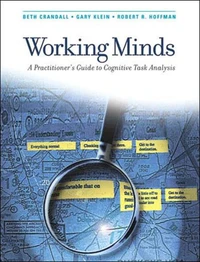Snapshots of the Mind
Par :Formats :
Disponible dans votre compte client Decitre ou Furet du Nord dès validation de votre commande. Le format ePub protégé est :
- Compatible avec une lecture sur My Vivlio (smartphone, tablette, ordinateur)
- Compatible avec une lecture sur liseuses Vivlio
- Pour les liseuses autres que Vivlio, vous devez utiliser le logiciel Adobe Digital Edition. Non compatible avec la lecture sur les liseuses Kindle, Remarkable et Sony
- Non compatible avec un achat hors France métropolitaine
 , qui est-ce ?
, qui est-ce ?Notre partenaire de plateforme de lecture numérique où vous retrouverez l'ensemble de vos ebooks gratuitement
Pour en savoir plus sur nos ebooks, consultez notre aide en ligne ici
- Nombre de pages448
- FormatePub
- ISBN978-0-262-37152-0
- EAN9780262371520
- Date de parution18/10/2022
- Protection num.Adobe DRM
- Taille12 Mo
- Infos supplémentairesepub
- ÉditeurThe MIT Press
Résumé
How people make decisions, size up situations, spot anomalies, and anticipate problems in real-world settings. Gary Klein, author of the bestselling Sources of Power, is the cognitive psychologist who discovered how people actually make decisions, particularly under time pressure and uncertainty. In Snapshots of the Mind, he offers a set of short essays-"snapshots" of different aspects of cognitive functioning in real-world settings that will help us learn to recognize the cognitive processes that underlie and drive performance.
In these essays Klein provides practical tools for escaping fixation on initial hunches and learning to detect the ways that people make decisions, size up situations, spot anomalies, and anticipate problems. Snapshots of the Mind grows out of the Naturalistic Decision Making movement, which studies how decision makers handle uncertainty and complexity in high-stakes situations. In the essays, Klein examines how people make tough choices and assessments in the real-world, discussing such topics as training, information technology, teamwork, expertise, and insights.
Debunking the idea that artificial intelligence will soon take over human decision making, he argues instead for machines that make us smarter and expand our expertise. He describes his Recognition-Primed Decision (RPD) model, which has been incorporated into Army doctrine and was one of the inspirations for Malcolm Gladwell's Blink. Snapshots of the Mind offers fresh takes on such topics as confirmation bias, anomaly detection, intuition, anticipatory thinking and perspective-taking.
Readers come away attuned to the primary aspects of expert cognition: the mindsets, mental models, and perceptual sensitivity.
In these essays Klein provides practical tools for escaping fixation on initial hunches and learning to detect the ways that people make decisions, size up situations, spot anomalies, and anticipate problems. Snapshots of the Mind grows out of the Naturalistic Decision Making movement, which studies how decision makers handle uncertainty and complexity in high-stakes situations. In the essays, Klein examines how people make tough choices and assessments in the real-world, discussing such topics as training, information technology, teamwork, expertise, and insights.
Debunking the idea that artificial intelligence will soon take over human decision making, he argues instead for machines that make us smarter and expand our expertise. He describes his Recognition-Primed Decision (RPD) model, which has been incorporated into Army doctrine and was one of the inspirations for Malcolm Gladwell's Blink. Snapshots of the Mind offers fresh takes on such topics as confirmation bias, anomaly detection, intuition, anticipatory thinking and perspective-taking.
Readers come away attuned to the primary aspects of expert cognition: the mindsets, mental models, and perceptual sensitivity.
How people make decisions, size up situations, spot anomalies, and anticipate problems in real-world settings. Gary Klein, author of the bestselling Sources of Power, is the cognitive psychologist who discovered how people actually make decisions, particularly under time pressure and uncertainty. In Snapshots of the Mind, he offers a set of short essays-"snapshots" of different aspects of cognitive functioning in real-world settings that will help us learn to recognize the cognitive processes that underlie and drive performance.
In these essays Klein provides practical tools for escaping fixation on initial hunches and learning to detect the ways that people make decisions, size up situations, spot anomalies, and anticipate problems. Snapshots of the Mind grows out of the Naturalistic Decision Making movement, which studies how decision makers handle uncertainty and complexity in high-stakes situations. In the essays, Klein examines how people make tough choices and assessments in the real-world, discussing such topics as training, information technology, teamwork, expertise, and insights.
Debunking the idea that artificial intelligence will soon take over human decision making, he argues instead for machines that make us smarter and expand our expertise. He describes his Recognition-Primed Decision (RPD) model, which has been incorporated into Army doctrine and was one of the inspirations for Malcolm Gladwell's Blink. Snapshots of the Mind offers fresh takes on such topics as confirmation bias, anomaly detection, intuition, anticipatory thinking and perspective-taking.
Readers come away attuned to the primary aspects of expert cognition: the mindsets, mental models, and perceptual sensitivity.
In these essays Klein provides practical tools for escaping fixation on initial hunches and learning to detect the ways that people make decisions, size up situations, spot anomalies, and anticipate problems. Snapshots of the Mind grows out of the Naturalistic Decision Making movement, which studies how decision makers handle uncertainty and complexity in high-stakes situations. In the essays, Klein examines how people make tough choices and assessments in the real-world, discussing such topics as training, information technology, teamwork, expertise, and insights.
Debunking the idea that artificial intelligence will soon take over human decision making, he argues instead for machines that make us smarter and expand our expertise. He describes his Recognition-Primed Decision (RPD) model, which has been incorporated into Army doctrine and was one of the inspirations for Malcolm Gladwell's Blink. Snapshots of the Mind offers fresh takes on such topics as confirmation bias, anomaly detection, intuition, anticipatory thinking and perspective-taking.
Readers come away attuned to the primary aspects of expert cognition: the mindsets, mental models, and perceptual sensitivity.





